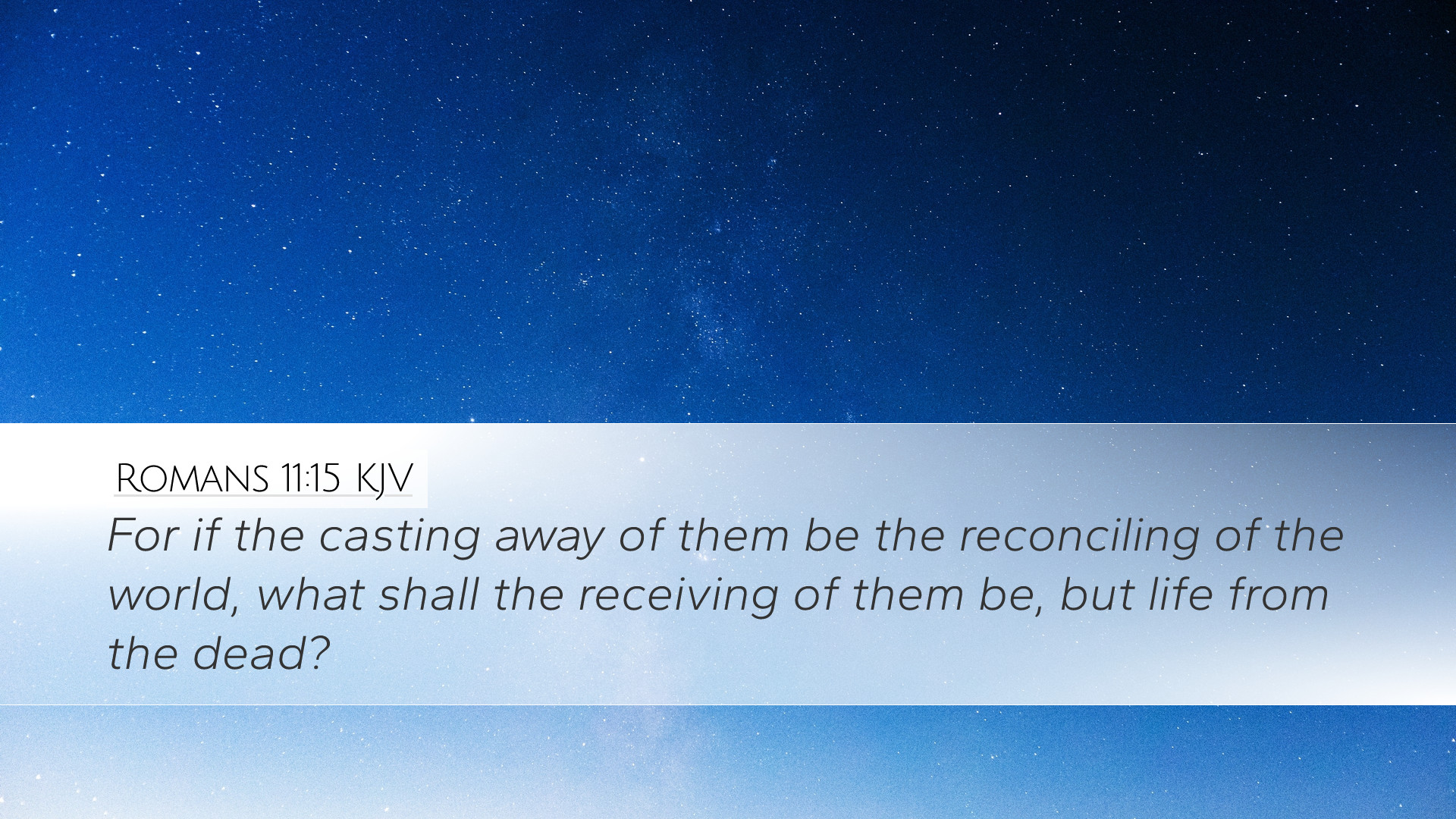Commentary on Romans 11:15
Romans 11:15 states: "For if their rejection is the reconciliation of the world, what will their acceptance be but life from the dead?” This verse offers profound insight into the relationship between Israel’s unbelief and the inclusive nature of God’s salvation.
Contextual Analysis
The Apostle Paul, throughout the Book of Romans, aims to demonstrate the righteousness of God and the implications of the Gospel for both Jews and Gentiles. In this particular chapter, he discusses the remnant of Israel and how their rejection of Christ has opened the door for Gentiles to receive salvation.
Insights from Public Domain Commentaries
Matthew Henry's Commentary
Matthew Henry highlights the theological significance of Israel's rejection. He notes that it is not merely a failure on the part of the chosen people but rather plays a critical role in the divine plan of redemption. His commentary indicates:
- Incomparability of Grace: Henry points out that the rejection of Israel led to the reconciliation of the world, showing how God's grace transcends human failure.
- Future Hope: He emphasizes that Israel’s ultimate acceptance will result in profound spiritual renewal, symbolically described as "life from the dead."
Albert Barnes' Notes on the Bible
Barnes provides a detailed exposition that connects the themes of rejection, reconciliation, and resurrection. He argues:
- Rejection and Reconciling Work: Barnes illustrates that the rejection of the Jews was a means by which God intended to gather others into His fold, enriching the world with His grace.
- Resurrection Imagery: He connects the "life from the dead" metaphorically to the revival of spiritual vitality in those who accept Christ—the dead in sin brought to life through faith.
- Future Restoration: Barnes also expounds on the eschatological hope that the eventual acceptance of the Jewish people will not only restore them but will also usher in a new era of divine blessing for the entire world.
Adam Clarke's Commentary
Clarke elaborates on the verse by emphasizing the dual aspects of God’s plan—judgment and mercy. According to Clarke:
- Theology of Rejection: He asserts that the rejection serves a greater purpose, aligning with God’s overarching plan of salvation history.
- Life from the Dead Explained: Clarke reflects on the phrase "life from the dead," interpreting it as a reference to both individual regeneration and the collective revival of God’s people.
- Believers’ Duty: He challenges present believers to reflect on their responsibility in light of such mercy, underscoring the urgency of their calling to bring the message of reconciliation to all.
Theological Implications
As we reflect on Romans 11:15 in light of these commentaries, several theological implications emerge for pastors, students, theologians, and scholars:
- Universal Scope of Salvation: The reconciliation of the world points to the inclusive intention of God’s redemptive work, suggesting that no one is beyond the reach of His grace.
- Redemptive History: The transition from rejection to acceptance emphasizes the dynamic nature of God’s plan throughout history, showcasing His ability to weave human actions into His divine narrative.
- Hope in Restoration: The anticipation of life from the dead serves as a powerful reminder of the resurrection hope that lies at the heart of Christian faith, both for individuals and communities.
- Call to Outreach: Acknowledging the role of the Gentiles in God’s salvific plan challenges believers today to take proactive steps in sharing the Gospel with all nations, reaffirming the church’s mission.
Conclusion
Romans 11:15 encapsulates a potent truth regarding God’s redemptive strategy that transcends temporal rejection and embraces future restoration. The insights from Matthew Henry, Albert Barnes, and Adam Clarke significantly enhance our understanding of this verse, encouraging an appreciation for the depth of God’s mercy and the hope inherent in the Gospel.
As we meditate on this scripture, let us be diligent in our mission, hopeful for the restoration of God’s people, and ever aware of the grace that abounds in Christ Jesus.


